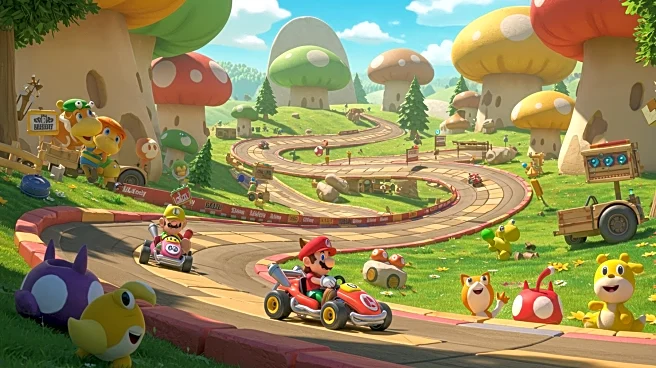What's Happening?
PETA has launched a campaign urging Nintendo to remove the brass nose ring from the Cow character in the popular game 'Mario Kart World.' The animal rights group argues that the nose ring is a painful reminder of the cruelty cows endure in the meat and dairy industries. Joel Bartlett, PETA's SVP of marketing engagement, addressed a letter to Nintendo's president, Shuntaro Furukawa, advocating for the redesign of the Cow character without the nose ring. The campaign highlights the use of nose rings in the cattle industry as tools of torment, causing lasting pain and discomfort to animals. 'Mario Kart World,' released on June 5, 2025, for the Nintendo Switch 2, has sold over 5.63 million copies, making it the best-selling title for the new console.
Why It's Important?
The campaign by PETA underscores ongoing concerns about the portrayal of animals in media and entertainment, particularly in video games. By targeting a popular game like 'Mario Kart World,' PETA aims to raise awareness about animal cruelty and influence public perception and corporate practices. If successful, this campaign could lead to changes in how animals are depicted in video games, potentially impacting the gaming industry and encouraging more ethical representations. The issue also highlights the broader debate on animal rights and the responsibilities of companies in addressing ethical concerns in their products.
What's Next?
Nintendo has yet to respond to PETA's campaign, but the advocacy group's actions may prompt discussions within the company regarding the portrayal of animals in their games. If Nintendo decides to alter the Cow character, it could set a precedent for other gaming companies to reconsider how they depict animals. Additionally, PETA's campaign might inspire similar actions from other advocacy groups, leading to increased scrutiny of animal representations in media and entertainment.
Beyond the Headlines
The campaign raises ethical questions about the intersection of entertainment and animal rights. It challenges the gaming industry to consider the impact of their character designs on societal perceptions of animal treatment. This could lead to a broader cultural shift towards more humane and ethical portrayals of animals in media, influencing consumer expectations and corporate responsibility.










